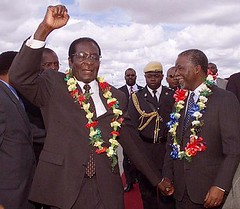
Zimbabwe President Robert Mugabe and former President Thabo Mbeki of South Africa. They are working on a power-sharing agreement in Zimbabwe.
Originally uploaded by Pan-African News Wire File Photos
Herald Reporters
South Africa has budgeted for a R300 million package to help Zimbabwe buy agricultural inputs ahead of the imminent summer cropping season while licences for ordinary people to import seed, chemicals and fertilizers are being issued at all ports of entry.
Decentralising the issuing of import licences is expected to speed up the importation of inputs.
South African Finance Minister Mr Trevor Manuel announced the inputs package in his mid-term budget to Parliament in Cape Town on Tuesday, saying Pretoria hoped the R300 million (US$30 million) would "assist in meeting Zimbabwe’s short-term food requirements".
Mr Manuel’s announcement follows the recent visit to Zimbabwe by South African technocrats from the Department of Agriculture, who met their Zimbabwean counterparts and assessed requirements.
"This development is a clear demonstration of the cordial and solid relations existing between Zimbabwe and South Africa at all levels. We must maintain this unity of purpose as indeed and as often stated, we are one people, sharing a common liberation history, culture and destiny.
"Let those in the farming sector prove their worth, for this farming season must mark the turning point in our economic recovery strategies," Zimbabwe’s Ambassador to South Africa Cde Simon Khaya Moyo said in a statement yesterday.
After successfully brokering a power-sharing agreement between Zanu-PF, MDC-T and MDC last month, former South African president Mr Thabo Mbeki pledged to assist Zimbabwe with inputs for this year’s farming season.
Cde Khaya Moyo said new South African President Kgalema Motlanthe recently endorsed Mr Mbeki’s pledge to help Zimbabwe.
On its own, the Zimbabwean Government is working flat out to prepare for the farming season.
Agriculture Minister Cde Rugare Gumbo yesterday said although the system of licensing private imports by those with free funds had already been in place, it was being intensified to cater for the increasing demand for grain, fertilizers, maize seed and chemicals.
"We are relaxing the rules so that anybody with capacity to import agricultural inputs, particularly seed maize, herbicides and fertilizers, can do so.
"Government is aware of the increased demand for agricultural inputs hence the move to decentralise the application and inspection programme to all the country’s entry points. The ministry has also included grain and maize-meal importers in the categories of people who will get these licences," he said.
Until the latest development, only Government and the Grain Marketing Board could import grain, maize seed and fertilizers.
Cde Gumbo said importers of ground foods such as maize meal, soya meal and wheat products need not apply for licences from the ministry.
Government on Wednesday announced that individuals and organisations could import inputs to avert shortages on the local market.
Farmers applying for inputs from Government yesterday urged the State to relax the application procedure.
Currently, farmers apply to the Resource Mobilisation and Utilisation Committee’s logistics sub-committee, which issues them an invoice to get the inputs from storage points.
"When you look at the process you have to go through, it shows that you will spend a long time moving from office to office when we are supposed to be at the farm," said Mr George Dube, who was at the sub-committee’s offices in Harare.
No comments:
Post a Comment